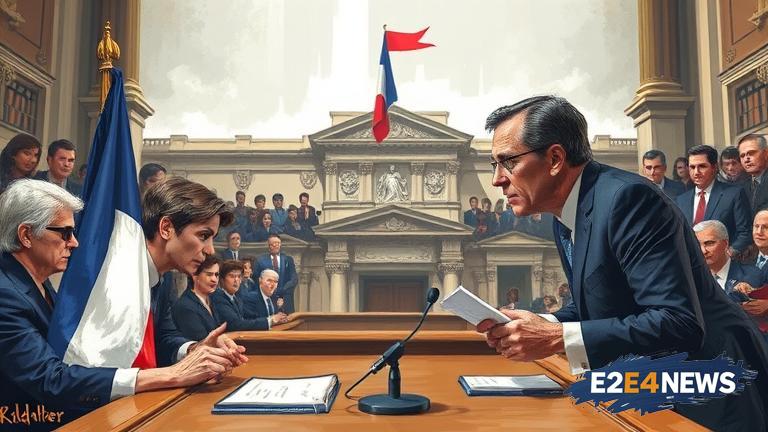The French Prime Minister’s decision to call for a vote of confidence has been met with a mix of reactions, ranging from skepticism to cautious optimism. This move is seen by some as a high-risk, high-reward gamble, while others view it as a calculated strategic maneuver. The vote of confidence is a parliamentary procedure that allows the government to demonstrate its majority support and reinforce its legitimacy. However, it also carries the risk of defeat, which could lead to a government reshuffle or even the Prime Minister’s resignation. The opposition has been quick to criticize the move, labeling it as a ‘kamikaze gamble’ that could destabilize the government and the country. On the other hand, government supporters argue that the vote of confidence is a necessary step to demonstrate the Prime Minister’s commitment to his policies and to rally support from his parliamentary majority. The vote comes at a time of heightened political tension in France, with the government facing challenges on multiple fronts, including the economy, healthcare, and national security. The Prime Minister’s popularity has been declining in recent months, and the vote of confidence is seen as an attempt to reverse this trend and regain the initiative. The opposition has vowed to use the vote as an opportunity to challenge the government’s record and to propose alternative policies. The vote is also expected to have implications for the upcoming European Parliament elections, with the government seeking to demonstrate its credibility and competence. Despite the risks, the Prime Minister remains confident of winning the vote, citing the government’s achievements and the support of his parliamentary majority. The vote of confidence is scheduled to take place in the coming days, and the outcome is far from certain. The government has been engaged in intense negotiations with its parliamentary allies to secure their support, while the opposition has been mobilizing its forces to maximize its chances of defeating the government. The vote will be closely watched by the French public, as well as by international observers, who will be seeking to gauge the government’s stability and the Prime Minister’s ability to lead the country. The outcome of the vote will have significant implications for France’s political landscape, with potential consequences for the government’s policies, the economy, and the country’s position in Europe. The Prime Minister’s decision to call for a vote of confidence has been seen as a bold move, which could either pay off or backfire. The government’s supporters argue that the vote will demonstrate the Prime Minister’s strength and leadership, while the opposition claims that it will expose the government’s weaknesses and divisions. The vote of confidence is a rare procedure in French politics, and its outcome is difficult to predict. The government has been seeking to reassure its supporters and the wider public that it has a clear vision for the country’s future and the policies to achieve it. The opposition, on the other hand, has been highlighting the government’s failures and promising to offer a more effective and responsive alternative. The vote will be a critical test of the Prime Minister’s leadership and the government’s ability to govern effectively. The French public will be watching the outcome closely, seeking to understand the implications for the country’s future and the government’s ability to deliver on its promises. The international community will also be monitoring the situation, given France’s importance in European and global affairs. The vote of confidence is a significant event in French politics, with potential consequences for the government, the opposition, and the country as a whole. The Prime Minister’s decision to call for a vote of confidence has added to the sense of uncertainty and unpredictability in French politics, and the outcome will be eagerly awaited by all stakeholders. The government’s fate hangs in the balance, and the vote will determine the course of French politics for the foreseeable future.
